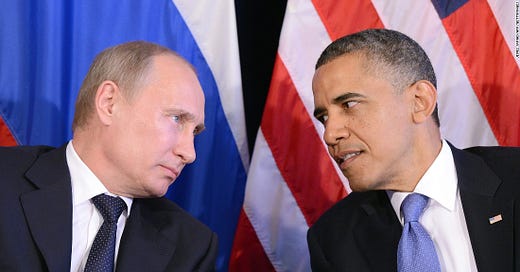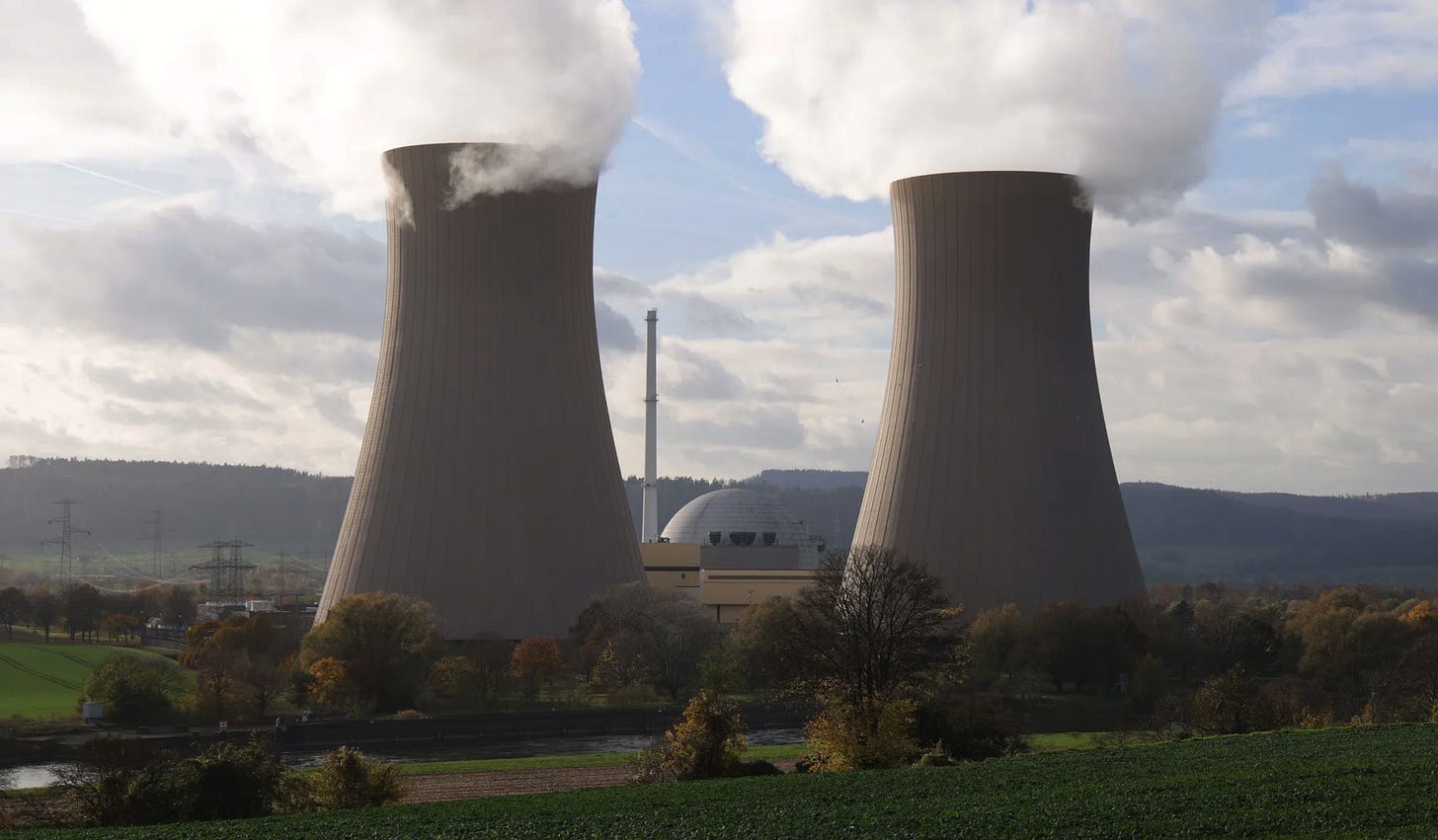Earthling: Was Obama right about Russia-Ukraine?
Plus: Biden threatens war against Iran; plastics-eating robot fish; apocalypse update; etc.
If President Obama’s successors had stuck with his policy toward Ukraine, would there be a war there now?
That question is raised by a 2015 New York Times article that Glenn Greenwald unearthed this week. And, though the answer, as with other great historical what-ifs, is “We’ll never know for sure,” you could make a case for “Probably not.” In any event, pondering the question has benefits—such as reminding us how constricted discourse about war becomes once a war is underway.
The Times article was about Obama’s refusal, in the face of bipartisan pressure, to send arms to Ukraine. Obama, the Times reported, “has told aides and visitors that arming the Ukrainians would encourage the notion that they could actually defeat the far more powerful Russians, and so it would potentially draw a more forceful response from Moscow.”
An anonymous source paraphrased Obama as asking questions like, “Okay, what happens if we send in equipment – do we have to send in trainers?” And, “What if it ends up in the hands of thugs? What if Putin escalates?” In the absence of satisfactory answers, Obama confined aid to things like helmets and night vision goggles.
After he left office, Washington reversed course and sent lethal military aid to Ukraine—billions of dollars worth. And, to answer Obama’s questions: Yes, that turned out to involve sending trainers to Ukraine—as well as conducting NATO-Ukraine military exercises on Russia’s doorstep; and yes, Putin escalated. This doesn’t mean that the former caused the latter, but the sequence of events leaves that possibility quite open.
By early fall of 2021, some American observers were warning that the kinds of fears Obama expressed were being born out. Ted Galen Carpenter of the CATO institute noted that Biden had continued and in some ways accelerated the flow of weapons started under Trump, including weapons that “Russia considers especially destabilizing.” Galen said Ukraine had become “a NATO member in all but name” and called this policy “arrogant, unwise, and potentially very dangerous.”
In Putin’s famously intense speech on February 21, a few days before the invasion, the flow of western weapons to Ukraine, and Ukraine’s increasingly close relationship to NATO, were central themes. Some American hawks claimed otherwise; they said Putin “barely mentioned” NATO (Josh Marshall of TPM), that NATO “barely merited a mention” (Julia Ioffe on WNYC)—and this view became the conventional wisdom. But in fact Putin mentioned NATO no fewer than 40 times in that speech. He said things like:
In the last few months, there has been a constant flow of Western weapons to Ukraine, ostentatiously, with the entire world watching...
The United States and NATO have started an impudent development of Ukrainian territory as a theater of potential military operations. Their regular joint exercises are obviously anti-Russian…
Ukraine is home to NATO training missions which are, in fact, foreign military bases. They just called a base a mission and were done with it.
If you object that NATO is a purely defensive alliance, so Putin has no grounds for treating it as a threat, you are missing Obama’s point. He wasn’t interested in judging the merits of Putin’s worldview; he was interested in predicting Putin’s behavior—which is what a responsible president should do in a situation like that. (And, actually, he was just assuming that Putin would react the way American leaders had long reacted to perceived threats that, viewed objectively, were pretty remote.)
Historians may eventually shed light on Putin’s motivations for invading Ukraine, though not enough to ever be sure about them. For now we can say that Obama’s concerns about Putin’s reaction may well have been on the mark.
We can say somewhat the same for his suggestion that a flow of weapons might dangerously embolden Ukraine’s military. The question of which side was more responsible for growing pre-invasion hostilities along the border between Ukrainian-held parts of the country and territory controlled by Russian-backed separatists is a he-said she-said issue. But given the power wielded within the Ukrainian military by its famously zealous Azov battalion, it’s certainly possible that assertiveness on the part of American-equipped Azov officers was a factor.
In any event, these are all good questions. So it’s unfortunate that, since the invasion, they’ve become virtually off limits. If you suggest that things like arming Ukraine or encouraging Ukraine to join NATO raised the chances of war, you’re accused of “reciting Putin talking points” or “justifying” Putin’s invasion (even if you explicitly and repeatedly say that the invasion was wrong and unjustified).
The rule seems to be: It was OK for Obama to worry that a prospective US policy might lead to future Russian aggression—he could raise that question without being labeled a Putin sympathizer. But if, a few years down the road, you suggest that he was right, that present Russian aggression may have been made more likely by past US policy—well, now you’ve gone too far.
Amid reduced Russian energy imports, Germany passed legislation to restart mothballed coal plants and boost the production of renewable energy – but not to reopen shuttered nuclear plants. Bryan Walsh of Vox argues that this legislation reflects a failure to prioritize the fight against climate change.
Many political leaders seem to agree that nuclear energy’s lack of carbon emissions is a compelling virtue. Belgium and France continue to invest in nuclear power, and the EU recently branded nuclear plants “climate friendly.”
Walsh concedes that nuclear energy carries dangers, as shown by accidents at Chernobyl and Fukushima, but thinks the risks are outweighed by the costs of climate change. That distinguishes him from Serhii Plokhy, author of the new book Atoms and Ashes: A Global History of Nuclear Disasters. Citing research that, based on nuclear power’s track record, predicts “one core meltdown accident every 37,000 reactor years,” he forecasts that the world will see another big nuclear disaster before 2036.
Historian Audra J. Wolfe, reviewing the book for The New Republic, found Plokhy’s argument persuasive. “Nuclear engineers add new safety features after each disaster,” she writes, “only to be astonished by the devilish and statistically unlikely path of the next one.”
Visiting Israel, Biden promised in writing that the US will “use all elements of its national power” to keep Iran from developing a nuclear weapon. This wording, in a joint US-Israeli statement, formalized his oral guarantee the day before that the US would attack Iran “as a last resort.”
This commitment to use military force to stop Israel’s chief regional adversary from going nuclear didn’t fully satisfy Biden’s Israeli hosts, according to David Sanger of the New York Times. Israeli Prime Minister Yair Lapid, Sanger reports, thinks the US shouldn’t wait until Iran reaches the threshold of developing a bomb to use force but rather should intervene to stop a program that could be headed in that general direction.
In other words, the US should adopt a policy more like that of Israel, which has engaged in assassinations, sabotages, and other acts of war over the past decade to set back Iran’s nuclear program even though the program isn’t now, in the judgment of US intelligence agencies, a nuclear weapons program.
Of course, Israeli disapproval of US policy toward Iran isn’t a new thing. Former Israeli Prime Minister Bibi Netanyahu fervently opposed Obama’s 2015 nuclear deal with Iran, which used a strict regime of inspections and 24-7 electronic monitoring to ensure that Iran’s uranium got nowhere near weapons-grade levels of enrichment. Indeed, it was with strong encouragement from Israel and some pro-Israel American donors, think tanks, and other influencers that Donald Trump withdrew from that deal in 2018.
The influence of powerful pro-Israel voices (including, for example, Democratic Sen. Robert Menendez, chair of the foreign relations committee) may also help explain why Biden, rather than negotiate a straightforward reinstatement of the deal upon taking office, stalled in various ways and added demands that went beyond the original terms of the deal.
In any event, here we are: Having obliged Israel by exiting the deal, America is obliging Israel by vowing to go to war, if necessary, to deal with the consequences of exiting the deal. And, according to the New York Times, that’s not good enough for Israel. Stay tuned.






